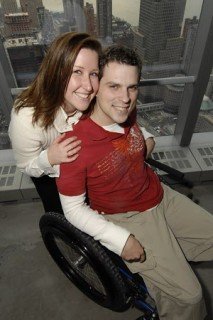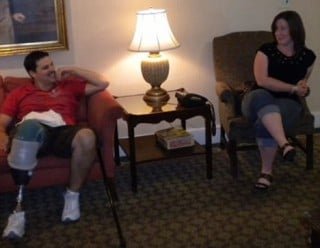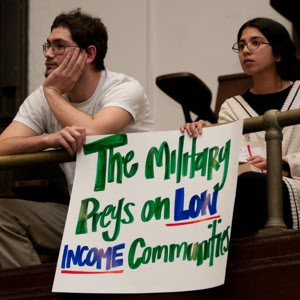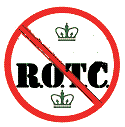Disabled Iraq Veteran is Heckled by Fellow Students in Debate Over ROTC Ban at Columbia University
A young Marine officer that I’ve become acquainted with and who respects the views of those who support our troops even as we question or oppose the occupation of Iraq and Afghanistan sent me a link to an anti-military, anti-war, anti-veteran act that took place at Columbia University recently that ticked him off despite respecting my views on the wars.
I now caution and advise him, and our readers to get all sides of the story. The only media sources to cover this incident thus far are not exactly non-partisan (New York Post, Fox, and the Daily Mail across the pond in the UK). That said, I also found some rather balanced reporting on military.com that covered the story from all angles, including the reaction of the Vet in question who intends staying at Columbia, and bucks critics of the University. Regardless, the act of a Disabled Vet being heckled at Columbia is being exploited by every far-right wing organization or group across the internet, and does NOTHING for the Peace Movement, nor those who question and oppose ROTC at Columbia. The debate will continue despite the repeal of DADT, dividing the faculty, staff, and students over the issue, plus gaining nothing but negative press coverage (even if only from a few media networks).
The repeal of DADT looks good on paper, but implementation is quite a different story. As a social experiment issue, a side of the military that gets too little attention, readers only need to look back at black integration into a white dominated Armed Forces. Laws were passed integrating the military shortly after WWII. However, racial strife continued into the Korean, and Vietnam Wars. Even when racial integration was achieved, the National Guard refused to allow people of color in the Guard until after the Vietnam War was over, due to its role in putting down civil rights protest, especially in the South, and later Vietnam war protests when black troops began to refuse to fight or be drafted in a white man’s war.
Point is that it may take longer to implement the repeal of DADT then even the hecklers at Columbia realize. However, it is no longer a question of an Ivy League College waiting for the full implementation of the repeal of DADT, but a legal question of does the Ivy League schools had a LEGAL leg to stand on with the legal repeal of DADT on paper. The main legal argument made by the elite colleges has been that since the Armed Forces discriminates against people based on their sexual orientation, Ivy League colleges need not allow a military presence on campus, especially ROTC units. That argument at least on paper is no longer valid, so the Ivy League colleges will have to find other legal means of keeping ROTC off campus.
Even Columbia can argue that it offers students desiring to attend ROTC courses the option of commuting to a nearby college offering the program(s), however this begs the question do ROTC students receive academic credit for ROTC courses from Columbia?
I personally believe that environment on an Ivy League college in reality takes an elitist, social class view of the military, ROTC, and Veterans that lingers from the WWII GI Bill, Vietnam GI Bill, and now the Post-911 GI Bill, however I also believe that at least Columbia is trying to take baby steps forward to be a veteran friendly administration if not campus.
With that said, I focused to two sides of the story, and leave the debate to our readers. I was happy as a lark to simply be able to attend college at all much less an elitist one where I personally would not have fit in, even if I were a genius. It can also be argued that the student body at most Ivy League schools most likely would have a difficult time getting into a state college, for they are not the shiniest apple to fall from the tree. Sociology and social class studies have shown that a significant number of Ivy League students gain entry to Yale, Harvard, and so on not via academic merit but the same way they would get out of the draft today if we had one – strings pulled by their wealthy moms and dads. However, this is only my humble opinion that indirectly applies to this heckling incident. Mind you also that it was very few in attendance who did this, the incident itself has been blown out of proportion (exploited) to promote the vision that every student and professor at this town-hall meeting heckled the disabled Vet. Nothing could be further from the TRUTH.
ROBERT L. HANAFIN, Major, U.S. Air Force-Retired, U.S. Civil Service-Retired, Veterans Issues Editor, VT News Network
Disabled Iraq Veteran is Heckled by Fellow Students in Debate Over Military Ban
 According to the Daily Mail in the United Kingdom, and New York Post in the USA, Iraq Vet Anthony Maschek survived being shot 11 times in Iraq, lost a leg and spent two years [at Walter Reed Army hospital] recovering from his wounds before earning [a Yellow Ribbon Program tuition paid entry to ] Columbia University in New York – an Ivy League university.
According to the Daily Mail in the United Kingdom, and New York Post in the USA, Iraq Vet Anthony Maschek survived being shot 11 times in Iraq, lost a leg and spent two years [at Walter Reed Army hospital] recovering from his wounds before earning [a Yellow Ribbon Program tuition paid entry to ] Columbia University in New York – an Ivy League university.
But the courage it took for the disabled veteran Anthony Maschek – a former U.S. army staff sergeant to use the first amendment rights he had earned in combat did not deter [a few] fellow students from heckling him when he tried to speak in favor of the return of ROTC to the campus in a fierce debate over Columbia University’s ban on ROTC units.
Maschek, 28, was hissed, booed and jeered at when he spoke in favor of [Columbia University] in New Yor k allowing the Reserve Officers’ Training Corps [ROTC] back on campus.
k allowing the Reserve Officers’ Training Corps [ROTC] back on campus.
Some students yelled ‘racist’ as he addressed the town hall meeting to discuss whether Columbia should end its 42-year ban on the ROTC.
Maschek, who was awarded the Purple Heart for wounds he suffered on the battlefield, said:
‘It doesn’t matter how you feel about the war. It doesn’t matter how you feel about fighting. There are bad men out there plotting to kill you.’
The first-year student broke both his legs and suffered serious wounds to his stomach, arm and chest in a fire fight near Kirkuk, northern Iraq, in 2008.
After two years recovering at the Walter Reed Army Medical Center in Washington, he enrolled at Columbia University to begin an Economics degree.
Columbia’s students are engaged in a heated debate over whether [ROTC] should again be allowed on campus after [the military] were banned in 1969 as a protest against the Vietnam War.
 In a 2005 vote the student body threw out the motion because of the U.S. army’s ‘don’t ask, don’t tell’ policy on gay soldiers. Even though DADT was repealed, more than half the students who spoke at the meeting still opposed the reintroduction of the ROTC.
In a 2005 vote the student body threw out the motion because of the U.S. army’s ‘don’t ask, don’t tell’ policy on gay soldiers. Even though DADT was repealed, more than half the students who spoke at the meeting still opposed the reintroduction of the ROTC.
Many carried anti-military signs bearing slogans including ‘One in Three Female Soldiers Experiences Sexual Assault in the Military,’and “The Military Preys on Low Income Communities.” (shown at left).
Herbert Gans, the Emeritus Professor of Sociology, told the New York Post: ‘Columbia should come out against spending $300 billion a year on unnecessary wars.’
But student José Robledo, 30, who commutes to Fordham University for ROTC coursework, told the newspaper: ‘The anti-ROTC side has been disrespectful and loud. They hiss and they jeer. It’s been to the detriment of the argument.
Read more: Badly-wounded Iraq veterans is heckled by fellow students in debate over military ban
Columbia University Task Force on the Issue of ROTC on Campus Releases Media Statement on the Heckling of Iraq War Veteran at Event on February 15, 2011
Columbia University Senate
Task Force on Military Engagement
NEW YORK, February 21, 2011— The Task Force on Military Engagement is a non-partisan facilitator of discussions [debate over] military [presence] engagement on campus with a strong focus on the issue of formal participation in the Reserve Officers Training Corps (ROTC) program [on campus].
The Task Force is made up of five students and four Columbia University faculty members. It was [formed] with the goals of informing the University community about the basic facts and history surrounding ROTC at Columbia, facilitating debate and discussion about ROTC at Columbia, and ultimately providing a report to the University Senate on campus opinion regarding ROTC.
To this end, the Task Force has been holding a series of University-wide public hearings. These hearings have been meant to provide a forum for community members to discuss the issues in an open and constructive manner. The hearings as a whole have been [thus far] considerate and thoughtful.
There have been very few instances where members of the audience have begun to interrupt speakers. With the exception of one brief exchange that occurred approximately two hours into the hearing on February 15, 2011, the Task Force’s process has been characterized by respect and civility.
It is the Task Force’s position that reactions from the audience that interfere with a speaker’s ability to express an opinion [violate] the notions of free speech and dialogue that the
Columbia community holds dear. The ability to respectfully listen to a comment with which one doesn’t agree—rather than attempt to silence it—is the bedrock of a tolerant and open community.
The Task Force has taken a number of steps, in addition to public hearings, to engage with the Columbia community. A non-partisan information resource website that does not take a position on the question of the Reserve Officers Training Corps program on campus has been created, with the intent of providing basic information on ROTC and its history at Columbia University.
The website is also acting as an up-to-date resource regarding Task Force decisions, and has been publishing submissions and letters received from the Columbia community on issues of ROTC and military engagement. The website may be found at
http://www.columbia.edu/cu/senate/militaryengagement/.
The Task Force also is conducting a broad survey of Columbia students to gauge attitudes towards ROTC and Columbia’s relations with the military. The survey involves the student bodies of Barnard College, Columbia College, General Studies, School of International and Public affairs (SIPA), and SIPA Energy Association (SEAS).
The survey opened on February 16th and will close on February 24th. The results will be included in the Task Force’s report to the University Senate, to be released in early March.
As a matter of record, Columbia University has a long history of [relations] with the U.S. Armed Forces.
– The growing community of student military veterans at Columbia today is due in part to the University’s active embrace of the Yellow Ribbon program .[1] Well over 300 veterans across 17 of Columbia’s schools are currently receiving tuition waivers from Columbia, with many funds matched by the Department of Veteran Affairs. This funding supplements the basic educational benefits provided by the Post-9/11 G.I. Bill.
– Columbia is the only private university recognized by G.I. Jobs as a “military friendly school.”
– During the course of World War II, Columbia hosted a U.S. Navy midshipmen’s school [Naval ROTC] that trained over 20,000 naval officers.
– The University has hosted leading military figures, such as Chairman of the Joint Chiefs of Staff Adm. Michael Mullen, who began his national speaking tour at Columbia in April 2010. (http://news.columbia.edu/oncampus/2000)
– In 2008, the University dedicated a new campus war memorial to honor Columbia alumni who gave their lives in military service, dating as far back as the American Revolution. (http://news.columbia.edu/oncampus/1192)
About the Columbia University Senate
The Columbia University Senate is the University-wide legislative and policy-making body at Columbia University. It is mandated to consider all matters affecting more than one school, or the entire University. Its 108 elected and appointed members represent faculty, students, administration, staff, alumni, librarians, and research officers. The Senate was established in 1969.
Columbia University in the city of new York
University Senate
For Immediate Release
Contact: Ron Mazor or Roosevelt Montas Co-Chairs
VETERANS TODAY EDITORIAL NOTES
I have paraphrased parts of the article above for clarity and placed my emphasis in [brackets]. Bobby Hanafin.
The Department of Veterans Affairs, Yellow Ribbon Program is a provision of the Post-9/11 Veterans Educational Assistance Act of 2008. This program allows institutions of higher learning (degree granting institutions) in the United States to voluntarily enter into an agreement with VA to fund a Veterans’ tuition expenses that exceed the highest public in-state undergraduate tuition rate. The institution can contribute up to 50% of those expenses and VA will match the same amount as the institution. The intent of the program is to provide Veterans with the financial capability to attend Ivy League or related private colleges that restrict entry by being too expensive for most Veterans to afford regardless if they meet admission requirements or not. Unfortunately, the VA program does not monitor, assist, or report on how Veterans transition to and will be welcomed at the Ivy League institution. However a college campus having a history and reputation of being anti-military and opposing ROTC on campus should tell any Veteran that WE are not welcome on that campus regardless what Veteran Friendly Rating the college gets.
We can’t quite understand what was meant by or the intent of calling Maschek a racist unless those few students interpreted something Maschek said to be racist. If they were heckling him, we’d have to assume they were not LISTENING to him, so how could they logically call him a racist. I’m not saying he’s not, it is only that the media coverage thus far is not clear on this emphasis. The anti-ROTC protesters may have meant Maschek was a racist for stereotyping all Muslims.
We don’t know if the figure of 1 in 3 female soldiers experience sexual assault in the military is accurate or not, but the fact that a significant number of female soldiers DO experience sexual assault is THE TRUTH. We also realize that the Armed Forces (both officer and enlisted) is composed mostly of the lower or working class and middle to maybe upper middle class, but why should that matter to a student body that comes from the upper middle to elite upper strata of America? Put another way we can relate to the anti-war sentiment at Columbia, but if the Pentagon did not send military recruiters out to low income communities and rural areas for its recruits, and middle class areas for its officers THEY would have to come from the student bodies in Ivy League colleges who frankly cannot relate to the lower or middle class anymore than they can relate to Veterans or our troops.
The Emeritus Professor of Sociology at Columbia, Herbert Gans, said, “Columbia should come out against spending $300 billion a year on unnecessary wars.”
That’s fine, but what does that have to do with allowing or barring ROTC on campus? Professor Gans should know that DADT as a legal argument for keeping ROTC off campus worked, however making a legal argument that ROTC is banned from campus because the American tax payer is wasting whatever billions or trillions on unnecessary wars simply is not gonna fly. BTW, I personally share Professor Gans take on the BIG BUCKS wasted on the occupations that could be better spent here at home to FIX OUR ECONOMY. I just do not believe making an anti-war argument is going to stand up to legal scrutiny to keep ROTC or military recruiters off campus.
To say that the anti-ROTC side was disrespectful and loud based on a few attendees is an exaggeration, we do however agree with Robledo’s view that “It’s been to the detriment of the argument,” can legitimately be expanded to mean that the incident will be detrimental to the anti-ROTC side, thus I post the response from Columbia which I view as both damage control and factual efforts to reach out to Veterans on campus.
For details on how Columbia was rated a Veterans friendly college go to http://www.militaryfriendlyschools.com/search/profile.aspx?id=190150
[1] (Yellow Ribbon Program) is a provision of the Post-9/11 Veterans Educational Assistance Act of 2008. This program allows institutions of higher learning (degree granting institutions) in the United States to voluntarily enter into an agreement with VA to fund tuition expenses that exceed the highest public in-state undergraduate tuition rate. The institution can contribute up to 50% of those expenses and VA will match the same amount as the institution.
Readers are more than welcome to use the articles I’ve posted on Veterans Today, I’ve had to take a break from VT as Veterans Issues and Peace Activism Editor and staff writer due to personal medical reasons in our military family that take away too much time needed to properly express future stories or respond to readers in a timely manner.
My association with VT since its founding in 2004 has been a very rewarding experience for me.
Retired from both the Air Force and Civil Service. Went in the regular Army at 17 during Vietnam (1968), stayed in the Army Reserve to complete my eight year commitment in 1976. Served in Air Defense Artillery, and a Mechanized Infantry Division (4MID) at Fort Carson, Co. Used the GI Bill to go to college, worked full time at the VA, and non-scholarship Air Force 2-Year ROTC program for prior service military. Commissioned in the Air Force in 1977. Served as a Military Intelligence Officer from 1977 to 1994. Upon retirement I entered retail drugstore management training with Safeway Drugs Stores in California. Retail Sales Management was not my cup of tea, so I applied my former U.S. Civil Service status with the VA to get my foot in the door at the Justice Department, and later Department of the Navy retiring with disability from the Civil Service in 2000.
I’ve been with Veterans Today since the site originated. I’m now on the Editorial Board. I was also on the Editorial Board of Our Troops News Ladder another progressive leaning Veterans and Military Family news clearing house.
I remain married for over 45 years. I am both a Vietnam Era and Gulf War Veteran. I served on Okinawa and Fort Carson, Colorado during Vietnam and in the Office of the Air Force Inspector General at Norton AFB, CA during Desert Storm. I retired from the Air Force in 1994 having worked on the Air Staff and Defense Intelligence Agency at the Pentagon.
ATTENTION READERS
We See The World From All Sides and Want YOU To Be Fully InformedIn fact, intentional disinformation is a disgraceful scourge in media today. So to assuage any possible errant incorrect information posted herein, we strongly encourage you to seek corroboration from other non-VT sources before forming an educated opinion.
About VT - Policies & Disclosures - Comment Policy






